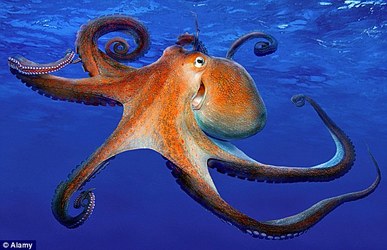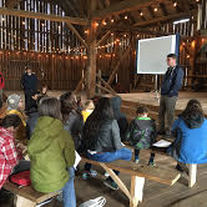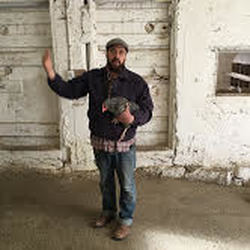 What has eight legs, nine brains, and three hearts? An octopus! I find the octopus absolutely fascinating, they are one of the most intelligent animals in the ocean. Yet, they never get the credit for it. Here is some information on the tentacled fish: - The octopus is classified as mollusk and has no skeletal strucutre but has a skull. -They are usually are 60-90cm long, eight limbs, and an oval shaped head. You can find these creatures in the shallow waters of tropical warm areas. - Their diet consists of worms, fish, crabs, and clams, but how do they eat? They have a toothed tongue (radula) and a beak. They open the shell then drill into it to fill the organism with a poison. Octopodes are very much lonely and are solitairy animals. They make their house in corals and rocks. They toss shells and rocks to hide them. The only time they leave is to hunt or reproduce. Octopodes have so many incredible ways to protect themselves. They have marking to scare away their enemies and dark colours on the suckers, eyes, and arms. Another tactic is to escape they will release ink and push itself through the water as fast 40km! 1) Their tentacles can sense taste. 2) They have blue blood. 3)They can remove a plug or unscrew a lid. 4)The octopus can regenerate a tentacle. 5) Their cells contract to camouflage to change colour and the texture of their skin! Yes, the octopus is weird, but you have to admit it is interesting.
1 Comment
 Earth day is such an important reminder to the world to take care of our planet. I was lucky enough to be invited along with three other students from my school, as environmental ambassadors, to an Earth Day celebration at J Steckle Heritage Farms. It was amazing to see so many young Earth advocates. Throughout the day we made organic potato soup, planted trees, and was taught how to compost! At Steckle Farms we learned about the importance of organic and locally grown foods. Also how Ontario farming is being affected by the loss of land. I never realized how important farming is to our planet. Did you know Steckle Farms only use natural fertilizers? This improves soil structures, reduces soil erosion, a rise in crops, and a decline in nutrient loses. There are so many great results because of organic farming. Here is a list of ways farming is making a difference in the environment: 1) Groundwater in areas of agriculture is filled with polluted with fake fertilizers and pesticides. Yet, with organic fertilizers they create enhanced water filtration. 2) Organics systems have better nutrients and diminish the chances of water pollution. 3) Organic agriculture uses renewable energy. 4) It creates massive biodiversity! 5) The incredible taste!  It was wonderful to celebrate Earth Day in such an amazing way, but I decided that I wanted to do more. I choose to keep the lights off and pick up garbage around my neighbourhood. I am so glad that Earth Day is celebrated internationally but hopefully we can make every day Earth Day. From our oceans and sharks, Happy Earth Day! |

Maddie Cranston,
--Ocean Warrior "We never know the worth of water till the well is dry." ~Thomas Fuller, Gnomologia, 1732 Archives
April 2018
Categories
All
|
 RSS Feed
RSS Feed
